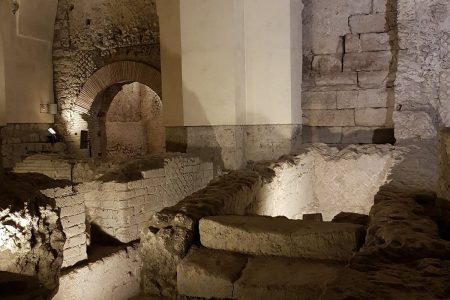Table of Contents
The Neapolitan dialect has very archaic origins and today represents a language in its own right. It is spoken fluently not only in Campania and neighboring southern regions, but also abroad, thanks to the thousands of emigrants who in the late 19th and early 20th centuries left Naples for America and South America.
From a purely lexical point of view, the Neapolitan dialect is a supra-regional idiom based on the ancient Neapolitan vernacular form employed in the Kingdom of Naples and over time partially replaced Latin for the drafting of official documents of the court of Naples by decree of Alfonso I in 1492.
The Neapolitan vernacular for centuries has acted as a bridge of union between the thought of classical antiquity and modern and baroque thought and between southern and northern European culture. It is no accident that the best-known fairy tales of European culture were first collected in Neapolitan.
At present, the Neapolitan dialect is second only to the Italian language in terms of diffusion in our territory. There has since been much debate on the subject because it was originally thought that theUNESCO had recognized the Neapolitan dialect as a language and World Heritage Site. In fact, it later turned out that UNESCO recognized it simply as a Language in Danger of Extinction.
You might be interested
Admission ticket to the Neapolis Sotterrata and the Basilica of San Lorenzo Maggiore
per person Book
The Museum of the Treasure of San Gennaro and the Royal Chapel in Naples (entrance fee)
per person Book
History and origins of the Neapolitan dialect
Exactly like Italian, Neapolitan is an idiom derived from Latin. One possible substrate is thought to be the Oscan language which was spoken anciently by the native populations of central and southern Italy, although Neapolis was known for its Greek roots. In any case, unequivocal traces on this subject are not evident to date.
Moreover, like any other language form, the Neapolitan dialect throughout its history has nonetheless undergone loans and influences by various peoples who inhabited Campania from the Middle Ages onward. These include Byzantine merchants, Lombard dukes of Benevento, and Norman, French, and Spanish rulers. As for Spanish and the alleged similarity between the two idioms, this would be due not to the centuries of domination, but mainly to the fact that both are neo-Latin languages and many commonalities can be attributed to Vulgar Latin.
During the reign of the Aragonese, it was proposed that Neapolitan continue to be the language of local government, without imposing Spanish or Catalan, but the attempt failed with the beginning of the Spanish viceroyalty in the early 16th century, when Italian was preferred. In the mid-nineteenth century, the Kingdom of the Two Sicilies used only Italian as its literary and administrative language, and thus the Neapolitan dialect never had the status of an official language, except for a short period of time (1442-1501).
Literature and music in Neapolitan dialect
Like other languages of the world, the Neapolitan dialect has a very long literary tradition. In fact, there is written evidence as early as 960 in the document Placito of Capua and in the 14th century in a vulgarization from Latin of The History of the Destruction of Troy by Guido delle Colonne. Instead, the earliest work in evidence written in Neapolitan dialect is the Diurnali, a chronicle of the most important events in the Kingdom of Sicily in the 11th century, possibly written by Matteo Spinelli of Giovinazzo.
The most important poet in Neapolitan dialect of the modern era was Julius Caesar Cortese who, as Giambattista Basile laid the foundation for the literary dignity of Neapolitan. Cortese's work Vaiasseide, a heroicomic poem divided into 5 cantos, where the linguistic meter and theme are lowered to the level of the protagonists who are precisely vaiasse, that is, Neapolitan commoners, can be remembered above all.
Prose in Neapolitan thus became famous mainly because of the aforementioned Basile, an author who lived in the mid-17th century, whose best-known work is Lo Cunto de li Cunti, ovvero lo trattenimiento de le piccerille, later translated by Benedetto Croce into Italian. A grandiose literature in Neapolitan dialect has thus flourished over the last 3 centuries, in often very different spheres and with peaks of very high quality. This is the case with the works of Raffaele Viviani, Ferdinando Russo, Eduardo Scarpetta, Antonio de Curtis, Eduardo De Filippo and Salvatore di Giacomo.
The Neapolitan dialect, however, has also found a place in Neapolitan songs, which derive from a long musical tradition and are now widespread throughout the world. Just think of the success of 'O sole mio, Italy's global anthem translated into many languages. Moreover, between the 17th and 18th centuries, or in the heyday of the neapolitan music school, this idiom was employed to compose opera librettos, such as Pergolesi's Lo frate 'nnammurato.
In addition to the great classics, however, Neapolitan today also finds wide use in pop, hip hop, rap and trap music. How not to mention Pino Daniele, Napoli Centrale and Nuova Compagnia di Canto Popolare, 99 Posse, Almamegretta, Tullio de Piscopo, Co'Sang and many others, in which Italian, Neapolitan, English, Spanish and other languages converge. From the 1970s onward, a new neo-melodic generation began with Gigi d'Alessio, Gigi Finizio, Sal Da Vinci and Nino D'Angelo, while in the last 10 years Neapolitan rap has made its way with Clementino, Rocco Hunt, Geolier, Luché, Enzo Dong and Lele Blade.



1 Comment